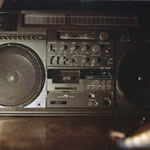|
|
 |
Dusted Reviews
Artist: Ill Lit Album: WACMusic Label: Badman Review date: Nov. 20, 2002 |

|
|
|
 |
Transmissions From Flavor Country
Ill Lit's WACMusic is like driving through the deep south of yore in a 1986 Chevy Celebrity with a half-functional radio on at full blast. You pick up a lot of static interference, itinerant preachers, and things that just don't make much sense. They come in and out, disrupting any hope of continuity your drive might have had. But as you switch stations (all of them country stations, bien sûr) and pass through several different broadcasting radii, every now and then amongst the noise you catch glimpses of true gems.
A note in the corner under the CD tray reads "we are country music." So much is pretty obvious from the vocals and guitars with at least a cursory listen, but that's just the start of it—the canvas onto which the real paint, the weird stuff, gets spread. The continuous electronic tweakery in the background, the sudden scratches of a rewinding tape, the dense sine wave accompaniment that plays the part of harmonica or slide guitar: there are many things here that, strictly speaking, should not be. Like the broken robot hums which line Grandaddy's The Sophtware Slump, or a Gerhardt Richter painting, in which the acutely rendered image isn't as important as the way it's later obscured, WACMusic is filled with little inconsistencies which make it something altogether more than just country music.
The dominant mood is a bleak one, from the opening "Diner Girls" to the plodding "Options," which borrows a depressingly blasé verse from "Somewhere Over the Rainbow" shortly before slowing down and fading out. Yet for the somber, homespun record you're led to expect from the onset and the shadowy artwork, it has its share of liveliness. "Other People's Wives" and "The Replacement Song" are, granted, far from cheery, but approach the formula with more enthusiasm than frailty (volume-wise, at least, they're more Wilco than Palace). The melancholy songs and the more upbeat ones keep the tone in a sort of limbo, but the discriminately-placed beeps and buzzes provide enough coherent moments of lonesome ambience to tip the scales. The darkness is primarily a conceptual one: the fact that most songs just fade into nothing, often before reaching their apparent destinations, is what keeps the sun from shining on them.
Not to say that WACMusic is entirely given to this blip-blip-country-boop construction. At points the Grandaddy comparison shines truer with pleasingly fuzzed-out rock tones, like in "Beating the Daylights Out of My Nightlife" and the aforementioned "Diner Girls" (in which singer D. Ahearn's fragile, effeminate tenor sounds most conspicuously like Jude (of "Rick James" fame)). Conversely, "Prestonhood" loses points for its ineffective male-female vocal duet and lyrics like "Southern California/ We're all cheering for ya," but, as though acknowledging the fact, it drowns out to its own tape squeaks before too long.
In fact, much of the effectiveness of WACMusic comes because, high or low, each song is fleeting at best; it's only a matter of time before it gets swallowed into the tape fuzz and the next one moseys in. Though ideas seldom get to develop, the mood is maintained from song to song and little feels lost. The record goes on, the beeps and hums rise and fall, and the Celeb rides off into the southern sunset.
By Daniel Levin Becker
|







